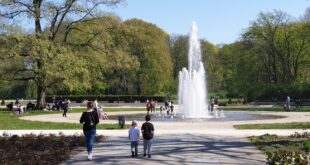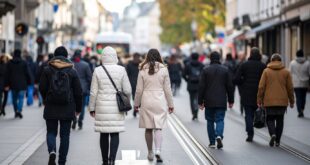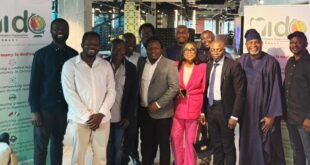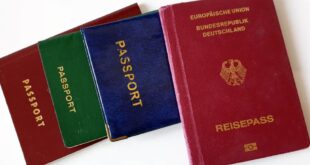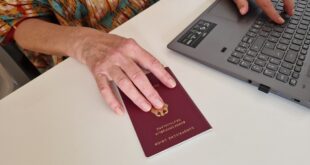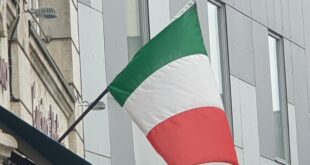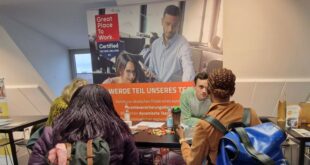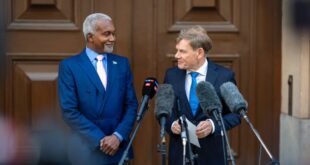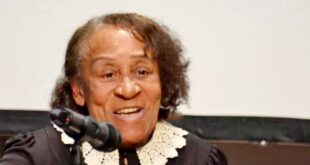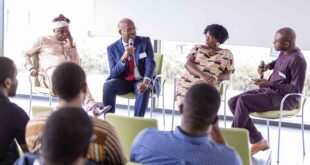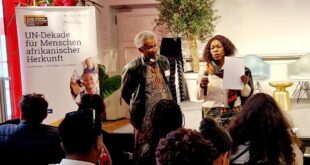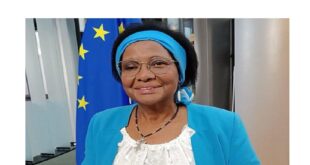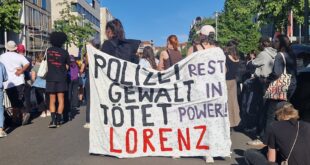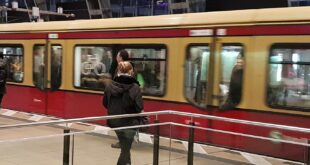The 11th Federal Government Integration Summit took place on Monday at the office of the federal chancellor in Berlin. Since 2006, representatives from the worlds of politics, business, education and civil society have been meeting regularly at the summits to discuss key integration policy issues. Chancellor Merkel used the event this year to kick off a long overdue debate on racism in the country. For the first time Germany has demonstrated its intention to seriously tackle racism at the highest level of governance by setting up a cabinet committee to deal with the problem.
German Chancellor Angela Merkel on Monday took up the issue of racism in a way that hasn’t been done at such a high level of government before. It was at the press conference on this year’s Integration Conference, at which she appeared with some of her ministers and representatives of migrant organisations, including Dr Sylvie Nantcha, chairman of The African Network of Germany (TANG).
Prior to the summit, the chancellor had met representatives of migrant organisations about the consequences of the recent racist killings in Hanau.
A 43-year-old German man gunned down nine people with a migration background at shisha bars in Hanau on 19 February, the latest albeit most shocking incident in the increasing racist violence in the country. The killer and his mother were subsequently found dead in their apartment.
Migrant groups issued an open letter after the Hanau killings on the need for a national debate on racism and far-right extremism in the country.
Merkel said the government mourned with families and relatives of the victims and “that we are of course very depressed that such acts have so far not been able to be stopped”.
She added: “We have to be alert well before the use of violence – it is about our culture of discussion, the choice of words, the social climate.”
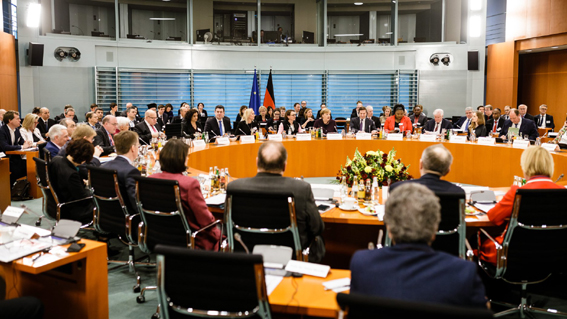
Merkel announced at the press conference the formation of a cabinet committee to advance the fight against right-wing extremism and racism.
Merkel said the decision to set up the new committee was based on the letter from migrant associations, which called for such a body.
“My great-grandfather was also a Pole,” said Merkel. In effect, she had a migration background, albeit in the fourth generation, she remarked. But nobody asked whether she was well integrated. On the other hand, people with dark skin would be constantly confronted with the question: where are you from?” Chancellor Merkel admitted.
“Everyone in Germany must feel safe and accepted in their dignity,” Merkel said, expressing an understanding for the situation of people with a migration history. She described the fight against racism, anti-Semitism and xenophobia as of “deepest concern” to her government.
The government wants to do more so that every citizen of this country, regardless of skin colour and belief, could live according to Article 1 of the Basic Law, which reads: “Human dignity is inviolable”, she assured.
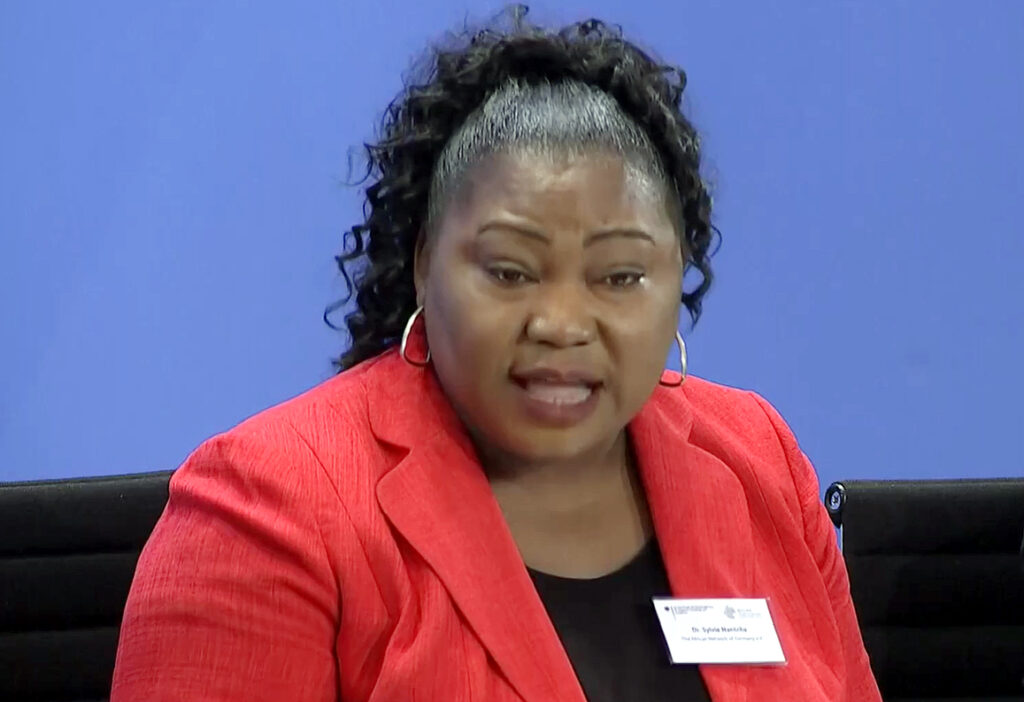
Dr Sylvie Nantcha, chairman of The African Network of Germany (TANG), who sat beside Chancellor Merkel at the press conference, addressed the issues of racism and hate crimes in her contribution. TANG is a network of more than 700 African associations and individual members in Germany, whose integration and development projects it coordinates.
“We’re outraged about the racially motivated terror act in Hanau. We share the pains of the relatives of the victims and our sympathy is for the families of the victims,” she said. “We ask ourselves if we’re still safe in this country, in this our land, in our Germany,” Nantcha continued. “We have long been part of this society and we deserve to be recognised as part of society.”
“Our society has a problem: racism. Racism in many forms,” she noted. “We’re experiencing racism against Muslims. We’re experiencing racism against Jews. We’re experiencing racism against Sinti and Roma. And often racism against Black people is ignored. Also, Black people are discriminated in this country. That has been confirmed by the UN which is why there is a UN Decade for People of African Descent. All countries including Germany have committed themselves to implementing this Decade.”
Nantcha expressed the delight of the migrant organisations about the swift decision of the federal cabinet to institute a cabinet committee against racism and right-wing extremism. She also praised the decision of the Merkel government to actively engage migrant organisations in the design of the Integration Plan. “They’re not speaking about us, they’re speaking with us,” she remarked. “We’re delighted to be able to make our contributions to these policies.”
TANG, a network body for African organisations in Germany, is involved in 12 working groups within the framework on the National Integration Plan, Nantcha revealed.
The integration summit, which last took place in 2018, focused on the question of what refugees and migrants should know before they come to Germany.
In view of the new Skilled Labour Migration Law, which entered into force on 1 March, the federal government wants potential migrant workers to acquire some knowledge about life in Germany in their country of origin – for example, learn German language and gain acquaintance with the culture.
The federal government wants to design and implement policies that make regulated immigration and integration to work better.
For the first time, a foreign guest, the Canadian Minister for Immigration, Refugees and Citizenship, Marco Mendicino, availed the Integration Conference of the experience of his country in the management of skilled immigration.
Femi Awoniyi
READ ALSO After Hanau, what German political leaders must do now
 THE AFRICAN COURIER. Reporting Africa and its Diaspora! The African Courier is an international magazine published in Germany to report on Africa and the Diaspora African experience. The first issue of the bimonthly magazine appeared on the newsstands on 15 February 1998. The African Courier is a communication forum for European-African political, economic and cultural exchanges, and a voice for Africa in Europe.
THE AFRICAN COURIER. Reporting Africa and its Diaspora! The African Courier is an international magazine published in Germany to report on Africa and the Diaspora African experience. The first issue of the bimonthly magazine appeared on the newsstands on 15 February 1998. The African Courier is a communication forum for European-African political, economic and cultural exchanges, and a voice for Africa in Europe.


